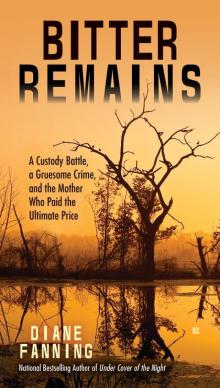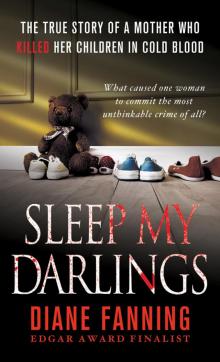- Home
- Diane Fanning
Baby Be Mine Page 5
Baby Be Mine Read online
Page 5
About 9:30, Kevin, Lisa and the baby they named Abigail made it to the Whistle Stop Cafe for breakfast. The Whistle Stop was in the middle of the block-long strip of buildings that was downtown Melvern.
As they stepped through the door, the mouthwatering aroma of sausage and bacon sizzling on the grill and biscuits baking in the oven made their stomachs growl in anticipation. Inside, the café was small, cozy and down home. Up the middle, two long groups of wood-grained Formica tables butted end to end from the front door to the kitchen. On either side, individual tables for four ran up the length of the side walls. All the tables were flanked by rigid chairs of black metal with maroon vinyl seats and backs.
The two side walls were decorated with old photographs, baskets and an assortment of antique kitchen tools with their red and green handles and splotchy rust spots. In celebration of Christmas, a tree covered with white lights stood in one corner and a clear glass bud vase filled with artificial red poinsettias adorned each table.
The menus featured good, old-fashioned diner fare with daily home-cooked specials—chili and meatloaf were sell-out favorites in the cold weather months. The pies were homemade and the coffee was just fifty cents a cup.
Country music played at a low level—too soft to cover the occasional clank and scrape from the cooking area in the back. A tall counter with a cash register blocked a complete view of the kitchen, but it was still partially visible to most of the diners.
Kevin and Lisa rarely patronized the café, but Kevin’s parents were well known among the regulars. The couple sat down at a small single table and Lisa set the baby carrier on the floor by her feet. They ordered fried eggs, bacon and hash browns.
As in most small establishments, the arrival of a baby—any baby—was an event that generated happy excitement. Everyone wanted to see her. All made cooing sounds in the infant’s direction with the hope that they would be rewarded by a gassy imitation of a smile. One of the customers carried the baby from table to table showing the little treasure to the dozen or so people present while Kevin and Lisa ate. Kevin’s eyes sparkled. His grin was so big and so constant that it was a challenge for him to chew his meal.
Whistle Stop owner Kathy Sage scowled with irritation. “Lisa, you don’t bring a newborn out in public,” she scolded.
“Yeah, it’s only a day old,” Lisa said.
“We didn’t know you were pregnant.”
“Most people didn’t,” Lisa said and turned her attention back to her breakfast.
Despite her sharp words to Lisa, Kathy couldn’t help admiring the baby. She smiled down at the pretty, petite infant in her pink bonnet. The Amber Alert Kathy heard on the news that morning did not cross her mind.
Kevin’s boss, Darrell Schultze, was there too. He hadn’t turned on the television or radio yet that day and was unaware that authorities issued an alert. Nonetheless, the presence of the baby gave him cause for alarm. The baby herself was one of the cutest Darrell had ever seen, but the timing of her arrival made him uncomfortable. “Where in the world did you get this baby?” he asked the couple.
After Lisa explained the story of the baby’s birth the day before in Topeka, Darrell said, “You didn’t look that close to delivery when I saw you a week ago.”
Kevin said the baby was small—Darrell could see that—then added that Lisa never shown much during any of her pregnancies.
Darrell asked Kevin about the birth experience and Kevin told him that he hadn’t been there. “I didn’t know about the baby till I got home and Lisa called me from Topeka.”
“You should have been there, Kevin. You can get off from work for that. Why didn’t you call him, Lisa?”
“I tried,” Lisa said, “but I couldn’t get hold of him.”
Something was not right with that answer. Acme Sign was Darrell’s company. He knew that it was always possible to get a message to any of his employees during the day—even for much more minor things than the birth of a baby. But he just complimented them on the baby and said nothing more.
After eating, the couple went up the street two blocks and around the corner to the parsonage of the First Church of God, where Kevin, Lisa and Kevin’s parents regularly worshiped. They wanted Reverend Mike Wheatley and his wife to see the baby.
When the Wheatleys opened the door, Kevin’s grin was so big it obliterated his cheeks. Lisa looked very tired—just like someone who’d given birth the day before. She was more quiet than usual, but the Wheatleys didn’t read much into that. They just blamed her tight lips on exhaustion.
They were a bit taken aback, though, by the trio on their doorstep because for months they had not believed that Lisa was really pregnant. They suspected that she only claimed to be to get attention. But there before their eyes was proof of the reality of her pregnancy. Nonetheless, they thought it odd that the Montgomerys were bringing the baby around to visit so soon.
Despite the surprising nature of the visit, the minister and his wife took turns holding the baby for about an hour. Lisa told them that she and Kevin selected “Abigail” because they wanted a biblical name for their child. Abigail was an obscure but real reference to one of King David’s wives in the Old Testament. The Wheatleys noticed a little scratch on the baby’s cheek as if she had gouged herself with her tiny fingernail. They observed a small bruise on the back of her hand. Neither of those little injuries seemed out of place, but they could not understand why the infant’s head was not misshapen from passing through the birth canal just the day before.
Kevin and Lisa then drove down to Lyndon, Kansas—the seat of Osage County. They stopped by the Lyndon County Courthouse, a large, blocky, tan structure built in 1921 in the center of town. They entered the high-ceilinged halls of the first floor with its shoulder-height pinkish marble panels on the walls. When it was new the courthouse must have been the ultimate in elegant formality. Now it was dated and tired. It was a clean and presentable building, but no amount of scrubbing could wash away the vague musty smell, and decades of use robbed even the purest surfaces of their sparkle.
Kevin, Lisa and baby ascended the long flight of marble steps to the second floor. Their first stop was the county appraiser’s office, where Lisa’s weekend coworker at Casey’s General Store worked on weekdays. Lisa’s friend was not there—all the staff of that office was out for a celebratory Christmas meal together. The only person behind the counter was an employee of the County Clerk’s office minding the desk in their absence.
Kevin, Lisa and baby Abigail went down one door to the county clerk’s office. The couple beamed as that staff oohed and aahed over the infant. Lisa shared her tale of the baby’s birth—the surprise when her water burst and the experience of driving with labor pains to the birthing center.
Their next stop was the home of Lisa’s ex-husband, Carl Boman, and his new wife, Vanessa. The couple rented a house in Lyndon from Lisa’s mother, Judy.
With defiance on her face, Lisa showed the baby to her former spouse—the father of her four children. Carl did not know what to say.
Vanessa pulled Kevin aside and asked, “Is this really your baby?”
“Yes,” Kevin said, his forehead creasing in befuddlement at her question.
“Are you sure Lisa didn’t buy it somewhere or steal it from someone?”
Kevin looked at Vanessa as if she’d lost her mind. He told Lisa it was time to leave. Lisa and Kevin then headed up State Route 31 back to their home in Melvern.
Although Lisa’s mother, Judy, lived on a farm in the outskirts of Lyndon, they did not take the baby for a visit. Unaware of the addition to her daughter’s household the day before and unaware of the Amber Alert that filled the airwaves, Judy was surprised by the phone call from one of her friends who worked at the courthouse. The woman congratulated her on being a grandmother again.
Knowing her daughter’s history, Judy said, “Yeah, right. She either stole it or bought it.”
9
The man who emerged from the dirty red import had sho
rt dark brown hair, lighter blond eyebrows and moustache and a darker goatee streaked with grey. The woman had shoulder-length dirty blond hair, heavy eyebrows, prominent cheekbones and a receding chin. She wore oversized glasses and was skinnier than any new mother should be. She looked pretty, but haggard.
The man, in an act of touching chivalry, went around to the passenger’s side of the car and opened the door. He helped the woman out of the vehicle and on to her feet. She walked with him into her home. In her arms she held a bundle close to her chest.
The man and woman seemed unaware of the net law enforcement cast around their home. As soon as they went inside, the net tightened—and the tension rose. The car looked right. The woman was blonde. And there was a newborn baby. But was it the right baby?
Randy Strong opened his car door and said, “We’re going in” to Sheriff Espey. Then, he turned off his cell phone.
In Maryville, Espey struggled to breathe evenly. His mind raced through a catalogue of bad outcomes—a shootout, a hostage-taking, a baby who did not survive the event. He dwelled on the possibility that this lead, too, would be a total dead end—just an innocent couple caring for their own child. He stared at the phone, willing it to ring.
In Melvern, Strong—as instructed by Espey—was the first one at the door. Kevin Montgomery answered the knock and invited them all in. What was going through Kevin’s mind as a herd of law enforcement stampeded into his home? Did he, at first, think it must have something to do with his wife’s half-brothers, Tommy or Teddy, whom he knew had frequent brushes with the law? Whatever popped into Kevin’s head, he was baffled by the intrusion into his home.
As Strong entered the house, he saw Lisa with a newborn baby in her arms. Next to her, he saw the blue glow of a television set. A notice of the Amber Alert for Bobbie Jo’s baby scrolled across the bottom of the screen.
Strong asked, “Is that your new baby?”
“Yes,” she said. “You want to see it?” Lisa stretched out her arms and handed the baby to Strong. On Lisa’s empty hands, a series of small, fresh cuts marked many of her fingers.
When questioned, Kevin related the call from Lisa in Topeka the afternoon before and his drive to pick up her and the baby and bring them both home.
Lisa explained her shopping trip to Topeka that was interrupted when her water broke. She told the officers about the delivery of her baby the day before at the Birth & Women’s Center.
While the couple talked to Strong and FBI Special Agent Michael Miller, other members of law enforcement checked out their stories. They learned that no babies were born at the birthing center on December 16.
Since the authorities had all the necessary warrants in hand Strong was able to turn and walk out of the house—with the baby girl still resting in his arms. He activated his cell phone and called Espey. “I have the baby in my hands.”
Tears welled in Espey’s eyes. As he shared the news with the personnel in the building, the tears flowed—tears of joy for the baby, tears of bitterness for Bobbie Jo. Espey brushed his away and headed out to address the media. Before Espey said a word to the press gathered in Maryville, officers posted outside of the Montgomery home saw media representatives driving past the farmhouse.
Strong stepped off the porch and handed the baby to an agent from the Kansas Bureau of Investigation. The investigator got into his car and rushed the infant to Stormont-Vail Regional Health Center in Topeka for evaluation and DNA testing. Strong returned inside to continue the questioning of the couple in earnest.
Lisa sat with a placid expression plastered across her face as Strong advised her of her constitutional rights. Then he confronted her with the information they learned about the lack of births at the center the day before.
At first, Lisa maintained her original story and Kevin insisted that it all was a big mistake. Why are they hassling us? he wondered. What right do they have to take my baby? His heart raced as he worried that his life was tipping over and he would never be able to set it upright again.
Under the persistence of the questioning, Lisa gave up. Her face sagged, her shoulders slumped. She confessed to strangling Bobbie Jo and removing the fetus with a paring knife she found in Bobbie Jo’s kitchen. She admitted that “Abigail” was the Stinnetts’ baby—not hers—not Kevin’s.
Only one person in the room was surprised—Kevin Montgomery. He felt like he was caught at a carnival on a manic Tilt-A-Whirl. He wanted off this nausea-inducing ride. He wanted to forget the tale his wife just told. It sickened him and confused him. It could not be true. He could not have married, lived with, slept with and trusted his own children to a woman who was capable of committing a crime this awful. This was not the Lisa he married. Not the woman he promised to love, honor and cherish. This was not his life. This was not his world.
Most people who knew Lisa found Kevin’s ignorance understandable. They also believed Lisa when she insisted that Kevin knew nothing. A clueless Kevin was a credible image. Lisa had been lying to people—and convincing them of the truth of her falsehoods—all of her life.
10
Lisa Marie Hedberg was born in Washington State on February 27, 1968. Her mother, Judy—born and raised in Kansas with six siblings—moved to the Northwest with her new husband when they got married. Lisa’s father, John Hedberg, was a native of Washington and an army man.
When John’s new assignment stationed him in Fort Riley, Kansas, the family relocated just west of Topeka. Known as “America’s Warfighting Center,” Fort Riley had a reputation for excellent training of the armed forces personnel who passed through the base. Built of native limestone, the post’s history extended back before the United States Civil War. Brevet Major General George A. Custer commanded the fort after the end of the war and up to the time he commenced his campaign on the high plains. The inconclusive foray resulted in Custer’s court martial and one-year suspension from the Army after Custer returned to Fort Riley to see his wife without permission.
During World War II, 125,000 soldiers were trained at these facilities, including heavyweight boxing champion Joe Louis and movie stars like Mickey Rooney. It was still a vital training center with strong relations to the community that surrounded it when John and Judy arrived on base with their baby, Lisa. During the assignment at Fort Riley, their second child, Patty, was born on June 3, 1970.
Lisa was a smart little thing—learning to read by the time she was 4 years old. Reading became a passion for Lisa. She never had time to play with dolls like other little girls. All she wanted to do was read and learn. Her mother said that when her oldest daughter was engrossed in a book, “the house could burn down and she wouldn’t even smell the smoke.”
The young girl was also obsessed with telling tall tales as the gospel truth. After her mother and father separated, she told everyone she met that her father died in Viet Nam.
After the dissolution of her first marriage, Judy was on her own with two young children. Her little family’s standard of living sunk below the poverty level. It was then Judy met a single father of five, Jack Kleiner. He seemed a godsend. She moved with him and his family to Oklahoma.
On June 6, 1974, the number in the household increased by one with the birth of Lisa’s first half-brother Teddy. The next year, Jerri was born on June 26, 1975.
In October of that year, Judy and Jack Kleiner were married. Their third and final child. Tommy, was born on April 6, 1978.
Though her lies made everyone in the family angry with her at one time or another, Lisa seemed to thrive. She continued her voracious reading and also learned to play the violin and French horn in grade school. In high school, she played the mellophone in the marching band, making first chair with ease. She acted in a class play and was active in the pep club and student council. She seemed to excel without any discernible effort, racking up A’s and B’s on her report card.
Beneath the surface of high performance, her mother saw the shadows of trouble to come. At times, Lisa seemed to switch from one persona
lity to another. One moment, she was a sweet, caring child. The next, she was “the daughter of the devil itself.” At times, she said, she shrugged it all off as the normal strange phases a child went through growing up. At others, she was afraid of what the future held for her child.
People who knew both Lisa and Judy placed the blame squarely on Judy’s doorstep. They said that all her life, Lisa heard her mother telling her that she wasn’t good for anything. Judy did not provide Lisa—or any of her children—with any stability, or the security of a mother’s unconditional love, one of Lisa’s friends insisted.
Her treatment of her children was as mercurial as her moods. As adults, all of Judy’s children said that getting along with Mom depended on which way the wind blew. Lisa, a friend said, learned to duck her head when the wind blew the wrong way.
In mid-February of 1983, one of the reasons for Lisa’s inner turmoil became apparent to Judy. She came home and walked into a sight that sickened her. She saw her 15-year-old daughter engaged in sexual intercourse with her husband—the girl’s stepfather.
Judy was stunned and terrified. Jack threatened to kill her if she told anyone. He was a violent man who had hit and knocked around her and the children for years. She believed he was capable of carrying through on his threat. “At first,” she said, “I kept my mouth shut. Then, I told a policeman and he took me to a lawyer.”
Even though the inappropriate sexual behavior was going on in her own home for quite some time, Judy claimed she was blind to it. Others argued that claim was a self-protective lie—Judy had known what Jack was doing for years; she simply placed her own well-being over that of her daughter.

 Death on the River
Death on the River Bitter Remains
Bitter Remains Gone Forever
Gone Forever Sleep My Darlings
Sleep My Darlings A Poisoned Passion
A Poisoned Passion Through the Window: The Terrifying True Story of Cross-Country Killer Tommy Lynn Sells (St. Martin's True Crime Library)
Through the Window: The Terrifying True Story of Cross-Country Killer Tommy Lynn Sells (St. Martin's True Crime Library) Chain Reaction
Chain Reaction Baby Be Mine
Baby Be Mine The Pastor's Wife
The Pastor's Wife False Front (Lucinda Pierce)
False Front (Lucinda Pierce) Under Cover of the Night
Under Cover of the Night Sabotage in the Secret City
Sabotage in the Secret City Written in Blood
Written in Blood Treason in the Secret City
Treason in the Secret City Wrong Turn
Wrong Turn Under the Knife
Under the Knife Mommy's Little Girl
Mommy's Little Girl Scandal in the Secret City
Scandal in the Secret City